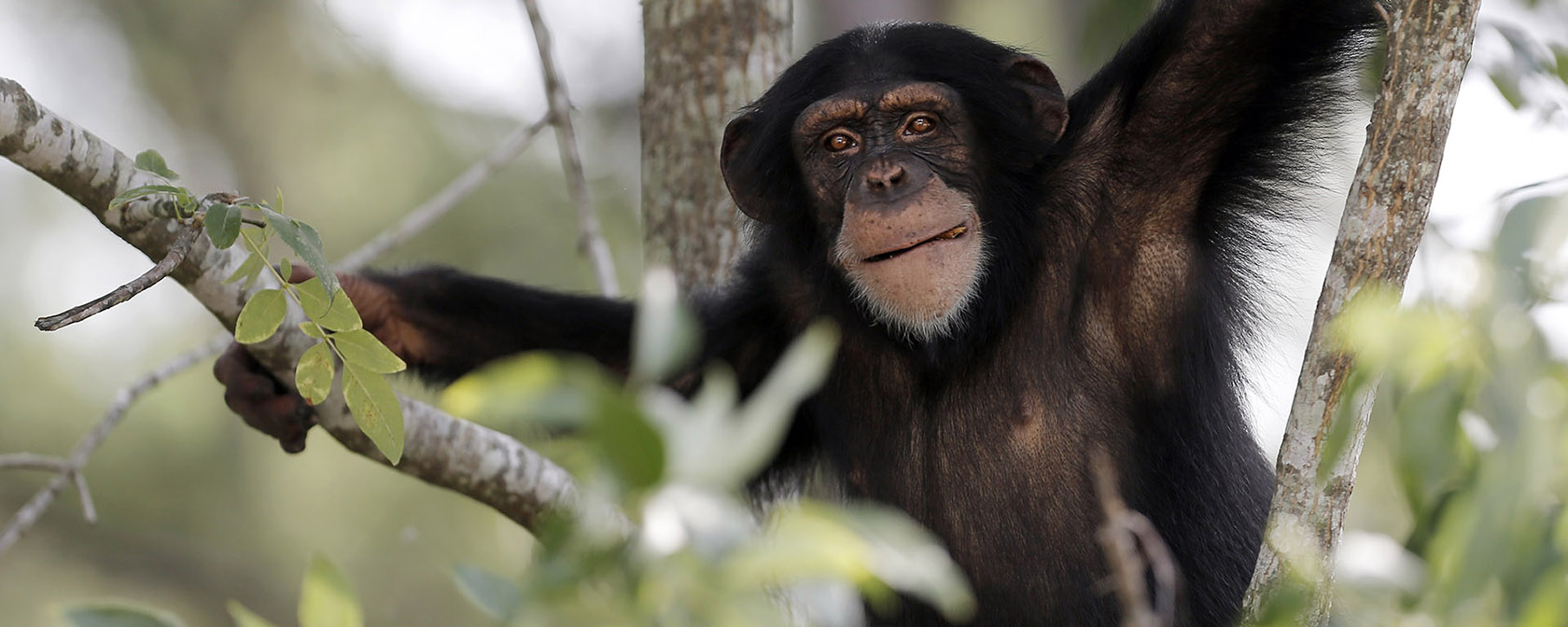The U.S. House of Representatives is moving forward on more of the bills funding various federal departments, and we are happy to report there are additional boosts for priority animal protection goals. Last week, the House Appropriations Committee approved bills covering the Departments of Health and Human Services, Homeland Security, Commerce, and Justice, among others. Next week, the House is expected to bring these pending bills, along with those considered in committee a few weeks ago, to the floor in a package known as a “minibus.” We will be working hard to support and protect these measures, several which are highlighted below.
Chimpanzee retirement
Congress mandated more than a decade ago that federally owned and supported chimpanzees previously used in animal testing be retired to the national chimpanzee sanctuary system once they were considered “surplus”—meaning they were no longer needed for research. In 2015, the National Institute of Health announced that it would no longer be using chimps in research, making all its owned and supported chimpanzees “surplus” and therefore eligible for retirement.
This move to a safe, enriching and comfortable environment—at Chimp Haven in Louisiana—has resulted in better lives for some of these deserving animals, and also saved taxpayer dollars. However, in a troubling development, the NIH announced in 2019 that it would not transfer the remaining chimps at the Alamogordo Primate Facility (APF) in New Mexico to Chimp Haven. Thankfully, report language accompanying the House Labor-Health and Human Services (Labor-HHS) Appropriations bill directs NIH to finally transfer and retire all of its chimps—starting with the chimps left at APF.
Alternatives to animal testing
With advances in science, there is little need for arcane and inhumane animal tests that are costly, time consuming, cruel, and unsuited to provide sufficient data to prove whether or not an ingredient or chemical is safe for human use. Recognizing the value of cutting-edge technology to produce human-relevant information, the Labor-HHS committee report notes that its bill does not increase funding for additional non-human primate research as the administration requested. The committee also directs NIH to create a Center for Alternatives to Animals in Research and Testing.
Dog imports
To provide a safeguard for animals, especially dogs, being brought into the United States, the House Homeland Security Appropriations committee report urges U.S. Customs and Border Protection (CBP) to collaborate with the U.S. Department of Agriculture to create guidelines on how to house live animals once they have entered the country and are waiting to be cleared for the final leg of their journey to forever homes.
The language also voices concern that CBP lacks adequate facilities to respond to the substantial increase in imported animals (there is only one airport—JFK in New York—that has a CBP-bonded facility capable of safely handling live animals). The Labor-HHS committee report echoes these concerns about the welfare of live animals, particularly dogs, being imported into the U.S. and urges the Centers for Disease Control and Prevention (CDC) to inspect cargo containing live animals as quickly as possible.
North Atlantic right whales
The House Commerce, Justice, and Science Appropriations committee report provides critical funding to the National Oceanic and Atmospheric Administration, nearly $17 million—a significant increase from last year—for North Atlantic right whale conservation efforts. These efforts may include research into new gear that will reduce fishing entanglements and regulatory mechanisms to reduce vessel strikes, which are the two largest threats to these animals.
Animal cruelty enforcement
We staunchly support efforts to upgrade the government’s ability to prosecute animal cruelty cases and have worked for more than 20 years through Congress and the Executive branch to strengthen enforcement of federal laws against animal fighting, horse soring, crush videos, wildlife trafficking and other forms of cruelty, and implementation of requirements in key laws such as the Animal Welfare Act.
In 2014, with our strong encouragement, the Department of Justice (DOJ) established an Animal Welfare unit within its Environment and Natural Resources Division (ENRD) that plays a central role in prosecuting animal cruelty cases. The DOJ attorneys who work on cruelty cases have expertise concerning environmental protection and animal welfare. For example, the DOJ successfully prosecuted Jeffrey Lowe and Tiger King LLC in a case pursued under both the Animal Welfare Act and Endangered Species Act.
Rep. Mike Garcia (R-Calif.) offered an amendment to the Commerce-Justice-Science Appropriations bill that would have carved into DOJ’s existing funds rather than providing an additional $2 million, and “silo” personnel in ways that could inadvertently force it to limit its animal cruelty enforcement work. We raised concerns based on statements from DOJ that requiring it to establish a separate animal cruelty crimes section within ENRD would impede the department’s efforts to expand its animal cruelty work. This amendment was defeated by voice vote. We will continue to work with Congress and DOJ to provide needed tools to actually strengthen enforcement efforts.
The power of the purse holds a lot of promise for animals, and for that reason we’re engaged with the budget deliberations of virtually every federal agency with jurisdiction that touches on animal welfare. Like an authorizing bill that passes, or an administrative rule that takes effect, the funding commitments Congress makes to these agencies can make a world of difference for animals. So we make congressional budgeting a priority focus in our work. These animal protection advances do not occur by chance or accident. They are the result of deliberate, thoughtful and engaged advocacy, the kind of advocacy you make possible as a supporter of the HSLF.




